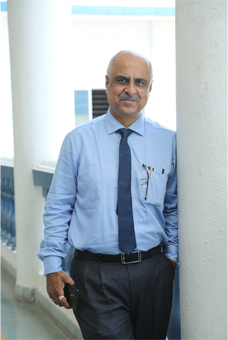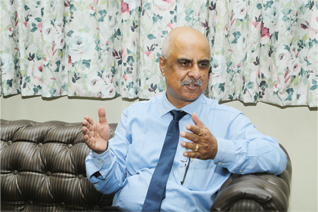"There are challenges in every role and every function. One needs to have an absolutely crisp approach, supported by clear framework in one’s mind. I strongly believe in PDCA cycle, (Plan, Do, Check, and Act). I feel that one should approach the challenges with a very sharp mind, focused diligence and apply the PDCA cycle"
In a long career of more than two decades, Maharana Ray, General Manager, Pro biking, Bajaj Auto, has a rich experience across a range of domains like Marketing, Sales (National and International) Training and HR. Having started his corporate career with Pepsi, he believes that if you want to achieve anything in life, you must work hard with due diligence and with utmost integrity. In an interview with Corporate Citizen, Ray talks about what millennials should focus on, what one needs in order to progress in their career journey and more…

I did my MBA in Marketing & HR from Symbiosis Institute of Business Management, Pune in the year 1989. I joined Pepsi as a Management Trainee in 1989. I have launched Pepsi all across Maharashtra except Mumbai. When you start your career as a management trainee, you are in the lowest rung in the ladder. Our job was to sell Pepsi, 40 shops a day, and to sell 200 crates was our daily target. During the process, I got exposed to the Metros, went into the depths of Tier I and Tier II cities in order to achieve the sales volume of Pepsi. In this journey, I learnt the true essence of sales management, dealer alignment, and achievement orientation. It was a fabulous five year stint.
After working with Pepsi, I worked in Dubai, as the National Sales Manager for a FMCG distributor. After one and a half years, I came back to India and joined Kinetic Engineering Limited, as Head of Direct Sales, from 1995 to 1997. (First of its kind in the two wheeler industry, in India).
Post that, I joined Bajaj Auto in the year 1997, as Sales Training Manager for Bajaj Auto Ltd. As a National Head, I conceptualized and executed capability building Programs for the dealer owners, dealer staff across sales, service & spares functions.
In 1999, I left Bajaj Auto and joined Oman Trading Establishment (OTE), Oman, where I was the Country Head (Sales) for brands like Hyundai, General Motors, Subaru and Isuzu. After my short stint in Oman, I came to India in 2002 and I re-joined Bajaj Auto. Since then the journey has been challenging and yet enriching.
In my career, I was fortunate enough to work in both domestic and international market. I have worked in Sales, Retail processes, Spare parts and Dealer Development. I happened to work in different cultures and faced different challenges.
In the year 2013, I completed a Management Development Program, in HRM and Services from IIM Ahmedabad.
My suggestion to the future employees would be that one should continuously raise the bar, stay focused and create a culture of excellence in whatever he/she does. This has to be supplemented with the help of commitment, conviction and absolute integrity.
Bajaj Auto is a great company. There was no specific reason to quit Bajaj in 1999, except for the fact that the offer which I got from Oman was from the four wheeler industry. There I worked on international brands like Hyundai, Subaru, Isuzu, and General Motors, which was an exciting opportunity for me. In 2002, I wanted to come back to India. Bajaj Auto offered me to re-join them, hence I came back.
I am a continuous learner and I like to keep myself updated with the current trends. I was nominated by our senior leadership for the Program, since this shows that magnanimity of the faith the leadership had in, to nominate me for such a prestigious Program. The icing on the cake was that it was an IIM Ahmedabad Program.
In Bajaj Auto we have various Business Units such as Motorcycle Business Unit, International Business Unit, Commercial Vehicle Business Unit and the Pro biking Business Unit. These are the front ends of the business. Pro biking Business Unit at present constitutes the KTM brand. My role as General Manager, Probiking, is to focus on Network Development & Dealer Development. Network Development focuses on creating new channel partners to achieve the optimum market presence. Dealer Development focuses on nurturing them in terms of capability, processes & systems.
"Gig economy is not new, it came into picture about 100 years ago. The term ‘gig’ started off with the music industry, where the musicians would say, ‘where is my gig tonight’? Which meant, where is my performance tonight? That’s how it started off and it sort of created a new work trend"
There are challenges in every role and every function. One needs to have an absolutely crisp approach, supported by clear framework in one’s mind. I strongly believe in PDCA cycle, (Plan, Do, Check, and Act). I feel that one should approach the challenges with a very sharp mind, focused diligence and apply the PDCA cycle. I strongly believe that, in terms of dealing with a challenge, you should anticipate the challenge, align your team with the challenge, adapt to the situation and act appropriately, I call this as a ‘4A’ approach, (Anticipate, Align, Adapt and Act).
Basically, I am an extrovert person. Interacting and networking with people have always been my strengths. Professionally, I always had the passion to excel in the domain of marketing and sales. As a result, I decided to work in marketing and sales. Having said that, I believe ‘Business is People’. Understanding the human dynamics is key to successful business-the right person for the right job gets the job half done.
Automation is here to stay. It is a reality now. In India, the adoption of robotic automation is increasing, but still in early stages. Factory automation has been the fastest emerging sector in Indian industry. In the automotive industry, automation is critical to a company's success and ability to keep up with new developments and state-of-heart technologies. What is needed is a joint effort by everyone in the industry to accept automation and do subsequent changes in employment sector. Speed and Perfection will be the key output of automation. It will increase productivity and reduce costs. Quality and sustainability will be improved. We need to embrace this change by building skills and capabilities.
I cannot throw much light on this topic as of now, but our eyes are on the ball. We are certainly working on differentiated disruptive products which we will bring to the market, and obviously incorporate those changes in the market. We will not be left out in terms of our demands from our consumers. We always start with our customers in mind and in alignment with our customers we have already initiated those changes.
I believe that, firstly, patience is a virtue that is still to be inculcated in today’s millennials. Secondly, they are smart, intelligent, but application of knowledge is nowhere to be seen. And thirdly, behavioral skills, in terms of respect and empathy need to be honed.
Campus to Corporate is a huge transition. One must be aware of the basic etiquettes to be followed in a formal environment. One should integrate the intellect, laterality and the meticulousness with sharp thinking in the work output.
The competition will always be there, we will respect that. I can only look upon what our company has to offer rather than worrying what the competitor has to offer. Ultimately, that’s what I can control. Factors which are important along with product manufacturing are dealer development, dealer processes, product processes, the sales process at the dealerships, the knowledge transfer to my channel members and the customer experience is very important. There are three things to be looked at, Product, People and Process. The three P’s must be aligned together to make the Product successful.
"Campus to Corporate is a huge transition. One must be aware of the basic etiquettes to be followed in a formal environment. One should integrate the intellect, laterality and the meticulousness with sharp thinking in the work output"

Gig economy is not new, it came into picture about 100 years ago. The term ‘gig’ started off with the music industry, where the musicians would say, ‘where is my gig tonight’? Which meant, where is my performance tonight? That’s how it started off and it sort of created a new work trend. Fundamentally speaking, everything is changing. If you consider our previous generation, first job was the last job. Life was very monotonous and mechanical. People used to work at a single company till they retired. They played safe and not akin to challenges. Today, that’s not done. Today, change can be seen everywhere. Changing of jobs is nothing new and it is very common. Since there are various opportunities, people seek after it. Not everyone likes the idea of employment. They might want to do something different. For example, if you have worked in a company and saved enough money, you can start your own venture. When people, say, in their 40’s, some of them are keen to get into something of their own, something new, something more challenging. Hence the concept of “Startups” came into picture.
Second significant fundamental change which has happened over the years is the surge in the remuneration. When you look at the salaries 15 years ago and salaries today, the gap is huge. Today, the salary of a management trainee starts at say Rs.10 lakh per annum. But if you ask the older employees, now who are in their 50’s, their CTC was not Rs.10 lakh even after having worked for 30 years in an organization. That is how life has changed. That is how it will change even more in the future. With that what has changed? Propensity to save has increased, leading to a much more secured life in owning materialistic assets and thus leading to exploring newer avenues to earn more money. In conclusion, one needs to be a specialist to be one above the crowd in the gig economy. Subject matter experts will be more sought after professionals.
Advice would be, follow and implement 4 Fs and 4 Ps in your professional and personal life. These points will be useful to grow and develop in your career. Four Fs are, Focus, Flexibility, Fast and Fun. Four Ps are, Positivity, Performance, Perspective and Passion. Also, be grounded and rounded.
Spending time with my family, going for long drives and exploring different cuisines.
Be a good individual. It takes guts to be kind. Be selfless and do good to others. In life, when a child is born, he is weeping and when he dies, others are weeping. So, let us have laughter and fun in our journey called ‘Life’.
By Vineet Kapshikar